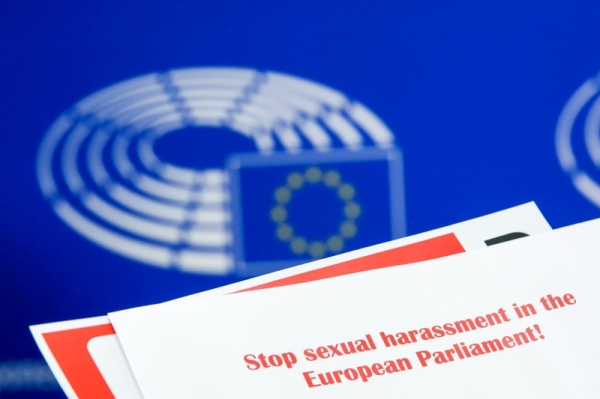MEPs give teeth to Parliament’s anti-harassment training
The European Parliament’s constitutional affairs committee on Wednesday (3 April) adopted new changes to its rules of procedure to prevent harassment and promote good office management — despite some pushback from both centre-right and far-right MEPs, according to the German lead rapporteur.
"The European People’s Party in particular resorted to delaying tactics, prolonging negotiations in committee and casting doubt on the need to change the rules of procedure," said lead MEP Gaby Bischoff (S&D) after the vote.
With 15 votes in favour, nine against and no abstentions, MEPs agreed to introduce concrete sanctions for MEPs who fail to complete mandatory anti-harassment training within the first six months of their mandate.
In short, completion of the training will be a prerequisite for holding office or acting as rapporteur in the next mandate.
"As a public institution as well as an employer, the European parliament has a duty to set the gold standard in tackling harassment in the workplace," stressed Bischoff (S&D).
The training consists of five different modules, ranging from successful team management to harassment prevention.
During this mandate, 319 MEPs (45 percent) have taken part in such a course, which the parliament called for in a resolution on "MeToo and harassment" in December 2021.
"Clear rules and strong sanctions must be in place to support a zero-tolerance approach towards inappropriate behaviour," the German socialist added.
Under the new rules, which still need to be approved at the plenary session in Brussels on 10-11 April, the parliament’s political group leaders will have the power to propose the removal of any elected office-holder who fails to comply with the training.
"The training is never a guarantee that harassment will not happen later on, but it could give some people some perspective and understand that there are certain lines," a volunteer with the campaign group MeTooEP told EUobserver.
It’s also a question of accountability, so if the MEP goes through the training they can’t say they didn’t know they were harassing their staff, that would no longer be an excuse.
"It also puts the responsibility on the members, not only for their own behaviour, but also to ensure that they are aware that they are managers and that they also need to keep an eye on the wellbeing of all these systems in their office," the volunteer with MeTooEP argued.
Harassment still an issue at the Parliament
To date, there is no data collection or assessment of harassment by the parliament, but a recent survey by the MeToo group shows that harassment is far from eradicated in the EU institution.
Out of 1136 responses, almost half of respondents experienced psychological violence and/or harassment — close to 16 percent reported experiencing sexual harassment or violence.
Workers who experience any kind of harassment in the EU institution can ask the parliament to protect them, for example by moving them elsewhere while their complaint is investigated — but the formal internal anti-harassment procedure is still long and not transparent enough, they explain.
One of the group’s main demands is an external and independent audit to improve the whole anti-harassment system.
"It is actually already in the rules that if you have been found guilty of harassment by the President, it should be prominently displayed on the parliament’s website. Yet it is not published anywhere," the MeTooEP people said.
There are currently some ongoing investigations into alleged misconduct by some MEPs, but only three MEPs have been found guilty of harassment during this term — liberal MEPs Monica Semedo and José Ramón Bauzá, and Spanish socialist Mónica Silvana.
According to the MeToo survey, the anti-harassment policy is still not widely known among Parliament staff and many respondents did not officially report abuse because of the power imbalance, fear of repercussions or the unclear reporting procedure.
Almost half of respondents said they had heard of it but were not sure what it was, around 31 percent said they knew quite a bit and almost 13 percent said they did not know it existed.
"Quite a few things have changed, but in our opinion not enough," said campaign group MeTooEP. "There are still quite a few things that, according to the data, are not progressing as they should."

